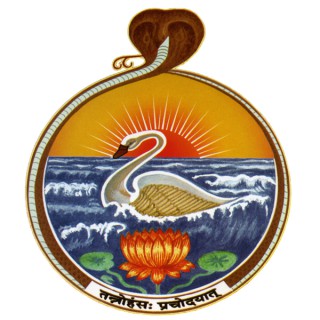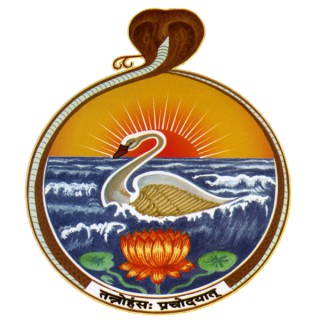Māṇḍūkya Upanishad | Advaita Nonduality
Follow Māṇḍūkya Upanishad | Advaita NondualitySwami Tattwamayananda’s exposition of the Mandukya Upanishad with Karika was given at the Vedanta Society of Northern California, San Francisco (founded by Swami Vivekananda in 1900) from April 13, 2012, to December 20, 2013, in a series of 44 lectures. The Mandukya Upanisad belongs to the Atharv…
Vedanta Society, San Francisco
- Mar 25, 2019 LATEST EPISODE
- infrequent NEW EPISODES
- 1h 2m AVG DURATION
- 44 EPISODES
More podcasts from Vedanta Society, San Francisco
Latest episodes from Māṇḍūkya Upanishad | Advaita Nonduality

44 – Concluding Session (iv) | Mandukya Upanishad with Karika | Swami Tattwamayananda
Lecture by Swami Tattwamayananda.

43 – Concluding Session (iii) | Mandukya Upanishad with Karika | Swami Tattwamayananda
Lecture by Swami Tattwamayananda.

42 – Concluding Session (ii) | Mandukya Upanishad with Karika | Swami Tattwamayananda
Lecture by Swami Tattwamayananda.

41 – Concluding Session (i) | Mandukya Upanishad with Karika | Swami Tattwamayananda
Lecture by Swami Tattwamayananda.

40 - Questions & Answers | Mandukya Upanishad with Karika | Swami Tattwamayananda
Lecture by Swami Tattwamayananda.

39 – Dialectical Confrontation: "Parinamavaada" (theory of evolution) & "Arambhavaada"| Ch 4 | Mandukya Karika | Swami Tattwamayananda
Verses: Mandukya Karika 4.11, 4.12, 4.13. Lecture by Swami Tattwamayananda. The dialectical confrontation between "Parinamavaada" (theory of evolution) of the Samkhya philosophers and "Arambhavaada" of the Nyaya-Vaisheshikas continues.

38 - Analysis of the Intrinsic Characteristics of "Prakrti" - Critique of the Samkhya theory of evolution | Mandukya | Swami Tattwamayananda
Verses: Mandukya Karika 4.9, 4.10, 4.11. Lecture by Swami Tattwamayananda. Vaisheshika's refutation of the "Parinamavaada" (theory of evolution) of the Samkhya philosophers. Accidentalism refuted.

37 - Sadkaryavada & Asadkaryavada – Mutual Contradiction between Samkhyas & Nyaya/Vaisheshikas. | Mandukya Karika | Swami Tattwamayananda
Verses: Mandukya Karika 4.4, 4.5, 4.6, 4.7, 4.9. Lecture by Swami Tattwamayananda. Showing the mutual contradictions among the non-Advaitic Schools establishes the truth of the doctrine of Non-origination. ‘Prakriti,’ the essential nature of things (swabhava) never changes. The four-fold nature of ‘Prakriti’ is explained.

36 – Refutation of ‘Kaarya-Kaarana-Vaada’:Establishing the Doctrine of ‘Non-Origination.’ | Ch 4 | Mandukya Karika | Swami Tattwamayananda
Verses: Mandukya Karika 4.3. Lecture by Swami Tattwamayananda. In his attempt to establish the doctrine of non-origination (‘Ajaativaada’), Gaudapada refutes the ‘Kaarya-Kaarana-Vaada’ (doctrine of the relation of cause and effect) held by the Samkhyas, Vaiseshikas, and Naiyyayikas.

35 – Going beyond Mind, Beyond Pain and Pleasure, Transcending the Shackles. | Ch 4 | Mandukya Karika | Swami Tattwamayananda
Verses: Mandukya Karika 4.1, 4.2. Lecture by Swami Tattwamayananda. “Asparsha-Yoga” is the source of all happiness and freedom.

34 – The Spiritual Journey Comes to an End. We Reach our Spiritual Destination. | Ch 3 | Mandukya Karika | Swami Tattwamayananda
Verses: Mandukya Karika 3.36 – 3.48. Lecture by Swami Tattwamayananda. We reach our spiritual destination with the realization of the unborn, changeless and immortal Brahman. There is no such thing as the birth of Jiva.

33 – When We Realize that Atman is the Only Reality, Mind Ceases to be Mind, Mind becomes Non-mind. | Mandukya | Swami Tattwamayananda
Verses: Mandukya Karika 3.32, 3.33, 3.34, 3.35. Lecture by Swami Tattwamayananda. When all the “vikalpas” are gone, the mind is no longer mind: then mind realizes itself as the Brahman. This is totally different from deep sleep.

32 – No Difference between Dream and Waking States. Both Are Identical. | Ch 3 | Mandukya Karika | Swami Tattwamayananda
Verses: Mandukya Karika 3.29, 3.30, 3.31. Lecture by Swami Tattwamayananda. All dualistic experiences are just the creations of our mind. When the mind stops they vanish.

31 – Refutation of “Asadvadins” | Ch 3 | Mandukya Karika | Swami Tattwamayananda
Verses: Mandukya Karika 3.26, 3.27, 3.28. Lecture by Swami Tattwamayananda. There can be no birth/creation whether real or illusory from nothingness (‘Asat’). Even an inquiry into what is absolutely unreal is meaningless.

30 – Negative Theology of Advaita-Vedanta | Ch 3 | Mandukya Karika | Swami Tattwamayananda
Verses: Mandukya Karika 3.26. Lecture by Swami Tattwamayananda. The passage from Brhadaranyaka Upanishad (II-3:6 and III-9:26) show that statements about creation should be taken only as secondary.

29 – Advaita is the Ultimate Spiritual Experience | Ch 3 | Mandukya Karika | Swami Tattwamayananda
Verses: Mandukya Karika 3.16, 3.17, 3.18, 3.19. Lecture by Swami Tattwamayananda. Dvaita and Visishtadvaita are only the early stages on our way to Advaitic Realization.

28 – All Scriptural Statements are Meant to Assert the Unity and Oneness of Creation | Ch 3 | Mandukya Karika | Swami Tattwamayananda
Verses: Mandukya Karika 3.15, 3.16, 3.17. Lecture by Swami Tattwamayananda. Advaita is described as the only foundation for a universal ethical philosophy and Spiritual Humanism. We hurt ourselves when we hurt others. Humanity is One Spiritual Family.

27 – Reference to “Madhu-Brahmana.” Gaudapada on “Mukhya-Sruti” and “Gauna-Sruti” | Ch 3 | Mandukya Karika | Swami Tattwamayananda
Verses: Mandukya Karika 3.12, 3.13, 3.14. Lecture by Swami Tattwamayananda. Reference to Brhadaranyaka text (Madhu-Brahmana: Madhuvidya). The idea implied in the karmakanda of the Veda that the Jiva and Brahman are separate is only figurative. Gaudapada distinguishes between “Mukhya-Sruti” and “Gauna-Sruti.”

26 – Atman is Indivisible, Changeless and Panchakosha-Vilakshana | Ch 3 | Mandukya Karika | Swami Tattwamayananda
Verses: Mandukya Karika 3.9, 3.10, 3.11, 3.12. Lecture by Swami Tattwamayananda. Atman is indivisible like the Akasha, birthless, deathless, and is the innermost Self of the five sheaths. It is also distinct from the five sheaths (panchakosha-vilakshana)

25 – Atman (Turiya) Ever Remains Pure | Ch 3 | Mandukya Karika | Swami Tattwamayananda
Verses: Mandukya Karika 3.7, 3.8. Lecture by Swami Tattwamayananda.

24 – Individual Soul (microcosm) and Universal Soul (macrocosm) are the Same (ii) | Ch 3 | Mandukya Karika | Swami Tattwamayananda
Verses: Mandukya Karika 3.3, 3.4, 3.5, 3.6, 3.7. Lecture by Swami Tattwamayananda.

23 – Individual Soul (microcosm) and Universal Soul (macrocosm) are the Same (i) | Ch 3 | Mandukya Karika | Swami Tattwamayananda
Verses: Mandukya Karika 3.5, 3.6, 3.7. Lecture by Swami Tattwamayananda.

22 – The Individual and Universal/Cosmic Consciousness | Ch 3 | Mandukya Karika | Swami Tattawamayananda
Verses: Mandukya Karika 3.3, 3.4, 3.5. Lecture by Swami Tattwamayananda. The three doctrines: Avachchedavada, Pratibimbavada and Abhasavada.

21 – Atman: The Unborn, Immortal and Eternal Reality | Ch 3 | Mandukya Karika | Swami Tattawamayananda
Verses: Mandukya Karika 3.1, 3.2, 3.3. Lecture by Swami Tattwamayananda. This chapter establishes non-duality by reasoning. This chapter explains the doctrine of non-origination.

20 – The Truth: We are already Liberated! | Ch 2 | Mandukya Karika | Swami Tattawamayananda
Verses: Mandukya Karika 2.32, 2.33, 2.34, 2.35, 2.36, 2.37, 2.38. Lecture by Swami Tattwamayananda.

19 – The Real ‘I’ Beyond Mind and Body | Ch 2 | Mandukya Karika | Swami Tattawamayananda
Verses: Mandukya Karika 2.29, 2.30, 2.31, 2.32. Lecture by Swami Tattwamayananda.

18 – Pragmatists, Linguists, Philologists | Superimpositions/False Identifications (Vikalpas) | Mandukya Karika | Swami Tattawamayananda
Verses: Mandukya Karika 2.27, 2.28. Lecture by Swami Tattwamayananda. Verses 20 - 28 of the second chapter describe the views of various non-Advaitin philosophers. They represent altogether 35 different 'vikalpas' (superimpositions) on the Atman. Verses 27 - 28 deal with the views of thinkers like Pragmatists (those who are not interested in metaphysics), the followers of Smrti texts, the school o Grammar, mostly those who were the fanatical followers of linguistics and philosophy, especially the followers of the Paninian School of Sanskrit Grammer.

17 - Baudhas, Indian Materialists, Mimamsakas | Superimpositions/False Identifications (Vikalpas) | Mandukya Karika | Swami Tattawamayananda
Verses: Mandukya Karika 2.24, 2.25, 2.26. Lecture by Swami Tattwamayananda. Verses 20 - 28 of the second chapter describe the views of various non-Advaitin philosophers. They represent altogether 35 different 'vikalpas' (superimpositions) on the Atman. Verses 24 - 26 deal with the views of Baudhas, some obscure schools of Indian Materialism, and the Vedic ritualists (Purva-Meemamsakas).

16 – Yajnikas, Samkhya, Atomists, Agamikas | Superimpositions/False Identifications (Vikalpas) | Mandukya Karika | Swami Tattawamayananda
Verses: Mandukya Karika 2.22, 2.23. Lecture by Swami Tattwamayananda. Verses 20 - 28 of the second chapter describe the views of various non-Advaitin philosophers. They represent altogether 35 different 'vikalpas' (superimpositions) on the Atman. Verses 22 - 23 deal with the views of some traditional Vedic scholars, ritualists (Yajnikas), some schools of Samkhya philosophy, Atomists, Indian Materialists (‘charvakas’), Agamikas (followers of Pancharatra or Saiva Agamas).

15-Pranavadins, Trivrkarnavadins, Samkhya, Pauranikas| Superimpositions/False Identifications (Vikalpas)| Mandukya| Swami Tattawamayananda
Verses: Mandukya Karika 2.20, 2.21. Lecture by Swami Tattwamayananda. Verses 20 - 28 of the second chapter describe the views of various non-Advaitin philosophers. They represent altogether 35 different 'vikalpas' (superimpositions) on the Atman. Verses 20 - 21 deal with the views of Samkhya philosophers, some Upanishadic thinkers like Pranavadins and Trivrkaranavadins, Saivas, some obscure schools of Vedantins, and Pauranikas.

14 - Similarities and Differences of Waking and Dreaming: Mental Projections | Ch 2 | Mandukya Karika | Swami Tattwamayananda
Verses: Mandukya Karika 2.13, 2.14, 2.15. Lecture by Swami Tattwamayananda.

13 - Waking and Dream States: Gaudapada and Buddhist Idealism/Realism | Ch 2 | Mandukya Karika | Swami Tattwamayananda
Verses: Mandukya Karika 2.6, 2.7, 2.8, 2.9, 2.10, 2.11, 2.12. Lecture by Swami Tattwamayananda.

Verses: Mandukya Karika 2.3, 2.4, 2.5. Lecture by Swami Tattwamayananda.

11 - Vedas: the Supreme Authority | Ch 2 | Mandukya Karika | Swami Tattwamayananda
Verses: Mandukya Upanishad 9, 10, 11, 12, Karika 2.1. Lecture by Swami Tattwamayananda.

10 - Experience is Beyond Words and Books | Mandukya Upanishad | Swami Tattwamayananda
Verses: Mandukya Upanishad 7, 8, 9. Lecture by Swami Tattwamayananda.

9 - Turiya: The Connecting Bridge and the Unchanging Perceiver | Via Negativa of Vedanta (iv) | Mandukya Upanishad | Swami Tattwamayananda
Verses: Mandukya Upanishad 6, 7. Lecture by Swami Tattwamayananda.

8 - Turiya: The Connecting Bridge and the Unchanging Perceiver | Via Negativa of Vedanta (iii) | Mandukya Upanishad | Swami Tattwamayananda
Verses: Mandukya Upanishad 7. Lecture by Swami Tattwamayananda.

7 - Turiya: The Connecting Bridge and the Unchanging Perceiver | Via Negativa of Vedanta (ii) | Mandukya Upanishad | Swami Tattwamayananda
Verses: Mandukya Upanishad 7, 8. Lecture by Swami Tattwamayananda.

6 - Turiya: The Connecting Bridge and the Unchanging Perceiver | Via Negativa of Vedanta (i) | Mandukya Upanishad | Swami Tattwamayananda
Verses: Mandukya Upanishad 7. Lecture by Swami Tattwamayananda.

5 - The Mystery of Waking, Dream, and Deep Sleep (iii) | Mandukya Upanishad | Swami Tattwamayananda
Verses: Mandukya Upanishad 5, 6, 7. Lecture by Swami Tattwamayananda.

4 - The Mystery of Waking, Dream, and Deep Sleep (ii) | Mandukya Upanishad | Swami Tattwamayananda
Verses: Mandukya Upanishad 3, 4. Lecture by Swami Tattwamayananda.

3 - The Mystery of Waking, Dream, and Deep Sleep (i) | Mandukya Upanishad | Swami Tattwamayananda
Verses: Mandukya Upanishad 2, 3, 4. Lecture by Swami Tattwamayananda.

















